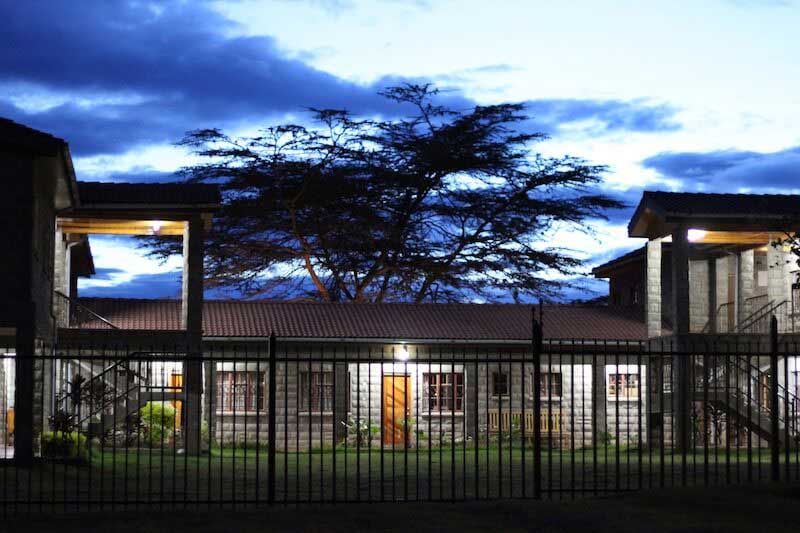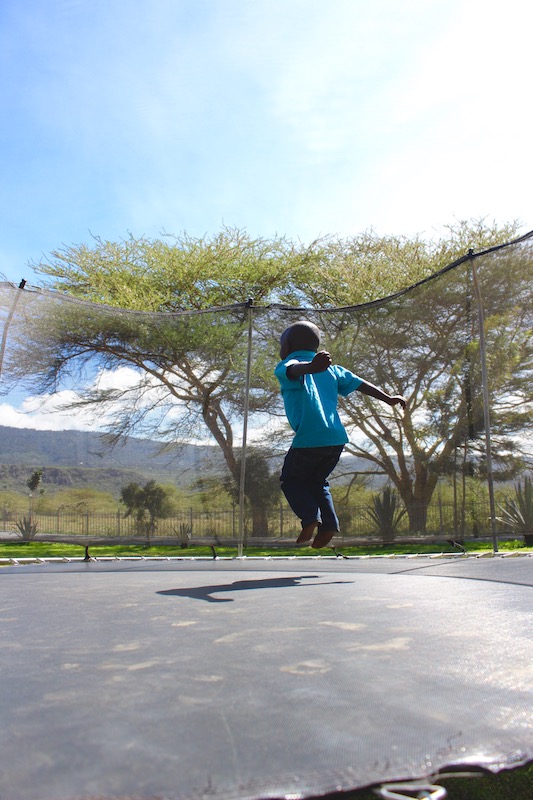
It’s nighttime and I’m sitting on the wooden bench in the central walkway of Naomi’s Village, listening to wind tousle banana leaves in the garden and the careful quiet that envelops the place when all the kids are finally tucked into their beds and drifting off to sleep. Night has fallen over the sunset like the curtain on the final scene of an opera – velvet cascading over grandeur with a finality that makes your soul want to stand up and applaud. I am searching for rain clouds in the dark sky when the door to the little boys’ dorm opens and a few pajamaed preschoolers step out into the cold.
I hear it immediately – not the pitter-patter of miniature Crocs on the concrete or the creaky door swinging shut behind them, but the sobbing. It’s the sound of sadness, the pure, exhausted sadness of a child, and it strikes a chord in my heart so immediately that my own eyes well up with tears. As he walks closer, I see the crying child wipe his wet cheeks and sleepy eyes, see the little boy sincerity written all over his face, and wonder what on earth is the matter. Then, I remember.
“He had a rough day at the hospital today,” our nurse told me over dinner earlier in the evening. The emotional exhaustion in her own eyes spoke for itself. That day had been check-up day for all of our HIV-positive kids – not the inane, my-how-you’ve-grown visit to a kind, old pediatrician, but the sort of check-up that involves big needles and foul-tasting medicine and the terror of looking a lifelong illness squarely in the face.
Now, he’d been woken up just an hour or two after snuggling into his bed, and was marching over to the main office to take his nightly dose of antiretroviral medication. He needs to adhere to a strict medication schedule to keep the virus at bay, to stay alive.
Sometimes, I am a fool.
Sometimes, I see this child confidently raising his hand in class or eating a gooey s’more by the bonfire and I think that everything is fine. I think of him on the day he came home to Naomi’s Village, fifteen months old and so malnourished that he fit into newborn clothes, and then I see him giggling with anticipation at the top of the slide and I forget.
I forget that he is sick.
I forget that his body won’t ever heal completely, that not even the smartest scientists know of a better alternative to fighting this cruel disease than endless medication and hospital visits. I forget that, barring a miracle, he will never remember a day this side of eternity when he does not take ARVs morning and night. Oh God, there is so much that I forget.
I get down on my knees on the concrete, stretch my arms out wide, and wait for him. I don’t know what else to do besides that, though I’d take his place if I could. He walks into my embrace as if it’s his destination, leans his full weight on my chest, and exhales the shaky, satisfied breath of a hurting child that has been heard.
“Sorry,” I whisper as I pick him up, “I am so, so sorry.” It’s not enough. We go into the main office, and he sits on my lap while he washes a handful of pills down his throat with water.
Across the room, another little boy takes his own pills, shifting his weight from one short leg to the other and chattering happily. I look at him, and all I can see is his mother.
It was almost exactly a year ago when I met her. A beautiful woman in her forties with five kids, she had inexplicably fallen sick and lost a lot of weight over the course of the last couple of years. By the time someone convinced her to go see a doctor, she weighed just over eighty pounds. Medical tests revealed a grim truth: she was in the late stages of AIDS, and battling tuberculosis with every shred of her failing immune system.
In other words, she was dying.
On the day that we met, she invited my family and I into her small home and, with labored breath, told us her story. I will never forget the weary love in her eyes when she caught a glimpse of her toddler son, who was regarding us visitors cautiously from across the living room. Even AIDS can’t emaciate a mother’s heart.
We prayed for a miracle. A few weeks later, God answered our prayer in the sort of sovereign way I will always rail against with wounded misunderstanding. He said no.
I have lately begun to feel that the red-roofed world of Bay Area academia exists in another universe from the sick boys, the late mother, and my home community in Kenya. A few days ago, one of my classes here at Stanford had a discussion on why the HIV/AIDS epidemic is a human rights crisis (as if that is even a question) and ideas for how to address it. I was shocked at how quickly and easily the discussion skirted around the very real, very overwhelming suffering of individual humans living with the condition and fell comfortably into the terrain of cost-effectiveness, statistics, and “limited access to resources”, which is really just a nice-sounding synonym for injustice. It is hard to hear people try to rationalize something that is so wrong, so unfair beyond comprehension.
During that class, I was silent. I didn’t mean to be, but I was overcome at the start of the discussion by the memory of tears in the eyes of the dying mother when my own mom abruptly took off her bracelet and fastened it on the woman’s frail wrist to remind her that she was loved, by the way her oldest daughter half-carried her exhausted frame to bed as we drove away. If this doesn’t have to do with human rights, then what does?
It wasn’t long before I tuned the discussion out entirely, the voices of my classmates replaced by the sorrowful, tired weeping of a sick preschooler. I’m starting to wonder if that sound will ring in my ears as long as I live.
God’s honest truth is that the world is so broken, so deeply broken, that even the most capable of us can never hope to put it back together again. Each of us was born sick into a dying world and, barring a miracle, we too will never remember a day this side of eternity when our hearts did not yearn for a cure.
Yet, absurdly, the gospel is that a cure is out there.
The gospel is that there is One who, arms outstretched in the night, is waiting to gather our sobbing souls up in his arms. The gospel is that there is One who has the power to take our place, to give the only sort of permanent healing that exists. Even if we have to wait until the curtain falls on the final scene of time, He will give us that healing in full.
It is this hope that I fasten around my own frail wrists as a reminder, this gospel that I cling to in my sickness and exhaustion of heart, that I wait for with desperate, childish faith.
For if not this gospel, then what hope do we have?
“And I heard a loud voice from the throne saying, ‘Behold, the dwelling place of God is with man. He will dwell with them, and they will be his people, and God himself will be with them as their God. He will wipe away every tear from their eyes, and death shall be no more, neither shall there be mourning, nor crying, nor pain anymore, for the former things have passed away.’
And He who was seated on the throne said, ‘Behold, I am making all things new.’”
Revelation 21: 3-5a

By Emily Mendonsa

Oh dear young sister in Jesus, you have it so right!
Emily you are such a beautiful writer-how soon we forget the illnesses we can’t see it is so sad so many suffer from this disease and even more gut wrenching when it’s a child-god bless you for being there for that child-love you -Aunt Monika